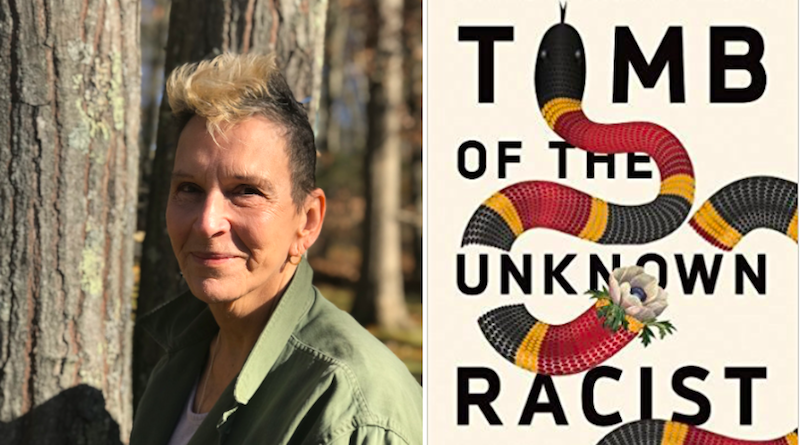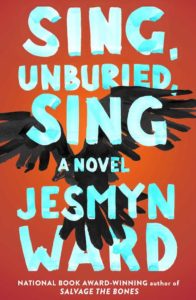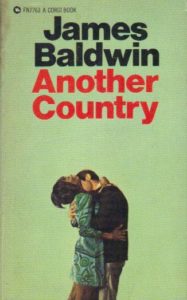
Blanche McCrary Boyd’s Tomb of the Unknown Racist, the third in a trilogy of novels including The Revolution of Little Girls and Terminal Velocity, has just been published by Counterpoint Press. We asked the author to speak about five books in her life and she chose the ones below, about political activism.
*

Jesmyn Ward, Sing, Unburied, Sing
I believe Sing, Unburied, Sing is the most brilliant novel anyone has written in a very long time. Jesmyn Ward is one of the most astounding writers I’ve ever encountered, and she’s still very young. I can’t think of other contemporary writers to compare her to; instead she makes me think of Faulkner and Flannery O’Connor and even Sophocles. Jesmyn Ward has a great unbridled (sometimes overdone) lyricism; she has an unblinking sense of tragedy, and she displays merciless love for every character she writes about. Her novels about contemporary black Mississippi explore the wreckage of the post-Civil War South so deeply that, as a Southerner, I feel a kind of relief I can’t explain.
Jane Ciabattari: Does Ward’s work have any influence on the contemporary political moment?
Blanche McCrary Boyd: I don’t know, because individual novels rarely matter politically, but Ward did win the National Book Award twice in six years, and, like Kiese Laymon and Colson Whitehead, she is blowing the top right off of the literary “canon.” If literature does matter politically, then these young writers certainly have great relevance to the current moment.

Kate Millett, Sexual Politics
I like to say I lost my political virginity when I read this book. At 25 I would never have dreamed of mocking icons like Henry Miller, D.H. Lawrence, and Norman Mailer, these literary men who were supposed to know so much about sex. Millett eviscerated them, and I kept laughing—even shrieking—with delight and recognition. She expressed much of what I could not yet articulate, but within a year I had declared myself a radical lesbian feminist, lived in a commune, and spray painted buses with slogans like “Sisterhood is Powerful.”
JC: Are young women reading Kate Millett today? What might she say to the #MeToo movement?
BMB: I have no idea, but she has certainly helped shape the current moment. About the #MeToo movement, she would probably just say something like this: well, I was wondering when women would wake up to their real situations.

Adrienne Rich, Diving into the Wreck and The Dream of a Common Language
I think Rich is the most important poet I’ve ever read, and I didn’t want to choose between these books. (Leaflets is great too.) In her poetry Rich looks deeply into the sexual and racial and political schisms of our experience, but Diving into the Wreck is where she explores these tragedies most directly. Most people can think, um, diving into the wreck, oh yes, I get it, men and women, but wait, race and class too? Like most of the writers I’m crazy about, Rich brings language to experiences that have not been described before, but her language…well, now I want to start talking like a critic and using words like metaphor or image or rhythm or else I just want to start quoting lines. So maybe I will:
“………….I am an instrument in the shape
of a woman trying to translate pulsations
into images for the relief of the body
and the reconstruction of the mind.”
—“Planetarium”
JC: And are young women (and men) reading Rich? And connecting her to #MeToo or others aspects of today’s sexual, racial and political schisms?
BMB: Yes, young women and men are still reading her, at least at Connecticut College, where I teach. For the last few years students have written and staged monologues dealing in very personal ways with sexual and racial and class issues. (This movement grew out of a yearly staging of The Vagina Monologues,the first performance of which I participated in, and we held it in our chapel.) Next year’s title for one of the performances is going to be “Diving into the Wreck,” so someone’s been reading their Rich.

James Baldwin, Another Country
I read this novel in college (not assigned, thank god) and was astounded. I had no idea anyone could write like this, so maybe I should just say here, “anything James Baldwin wrote,” because Baldwin was a literary genius and a revolutionary thinker. Anyone who reads his essay on Black English will understand that we are still trying to catch up with his insights. I have great respect for the fact that he moved to France and made a personal solution for himself.
JC: What makes Baldwin resonate today?
BMB: I think Baldwin is for African-American thinking what Kate Millett is for feminism: their influence is so pervasive that their roles as sources aren’t always recognized. Baldwin’s essay, “If Black English Isn’t a Language, Then Tell Me, What Is,” nailed 50 years ago the insight that what we used to call “correct English” (the term has now been amended to “standard English”) is actually what I tell my students is best described as “power English.” Standard English is the language of power in America, and we all have to demonstrate that we can use it so we won’t be written off as stupid. (When I first came North in 1965, white Yankees tended to assume I was stupid because of my accent and indifference to speaking “correctly.”) And, of course, Baldwin’s novels are crucial to understanding American history and culture as well as the current political moment.

Art Spiegelman, Maus I, Maus II
Spiegelman’s work is not only about his parents‘ suffering in the Holocaust, it is about how we who have inherited these two world wars and the monstrous pain and deaths they engendered can go on with our daily lives. How can he make growing up wanting to draw Tubby cartoons fit together with his parents’ story? And how can I go from spray painting busses to having children, a mortgage and a minivan? Maus is genre-shattering, a genius work, and, again, it tries to integrate the personal with the political, the individual with the historical, the local with the global. Same old questions, same old struggles.
JC: What can we learn from Maus I and Maus II about the inherited racism and legacy of slavery and recurrent waves of white supremacist activism in the US?
BMB: Maus I and Maus II have influenced me as a writer in a number of ways. The bravery, imagery, originality, irony, and fundamental humor of drawing the Germans as cats, the Jews as mice, make these works unclassifiably brilliant. These books inspire me partly because I am often comforted by the cavalier and stupid rejection letters Spiegelman accumulated. (They’re printed in his later book MetaMaus.) Spiegelman gave me more courage to embrace my authenticity in Tomb of the Unknown Racist, and I return to him often. I also love his brevity and the speed of the books, which I also tried to achieve.
I don’t think any particular books influenced Tomb of the Unknown Racist, except Maus I and Maus II. I simply, as always, wrote the book I wanted to read. Tomb is about the elephant in the room in white American fiction. It’s race. White writers don’t seem to recognize our whiteness and its implications.


